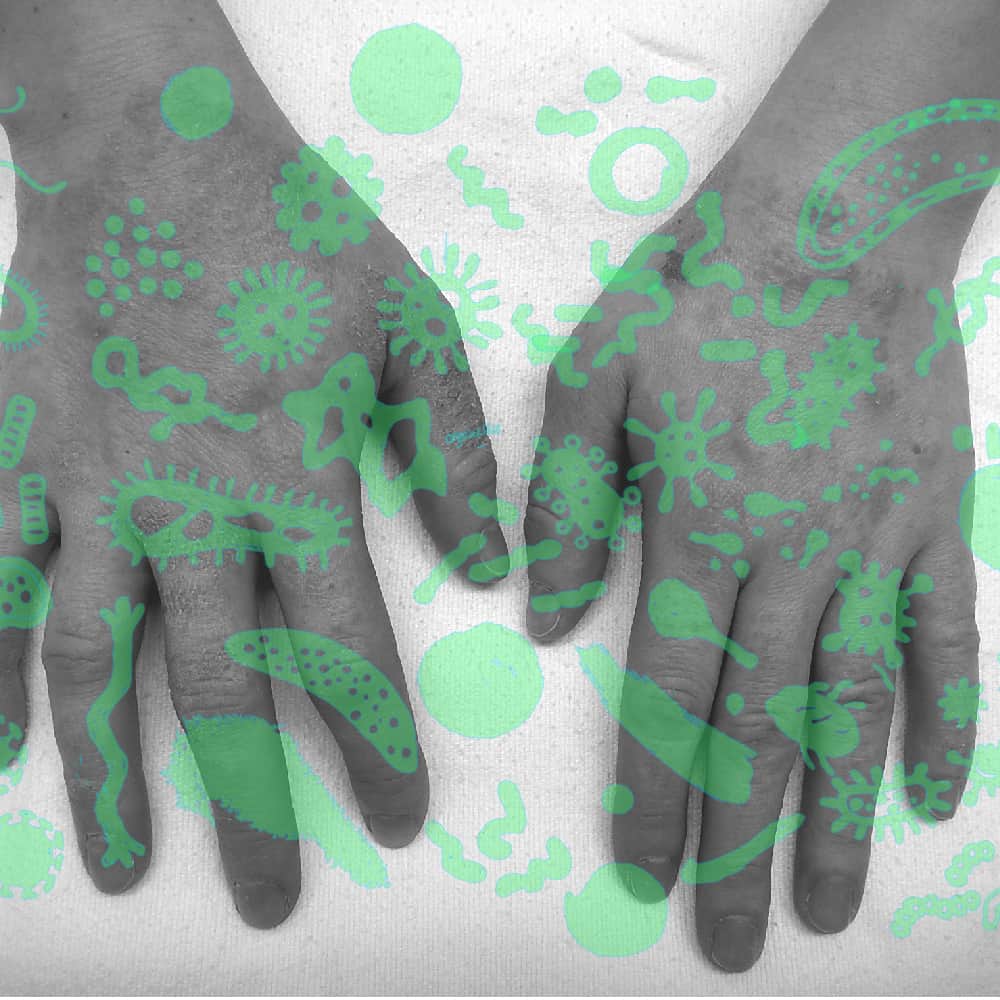Eczema is a very common, chronic inflammatory condition of skin characterized by redness, itching, and oozing vesicular lesions. The most common form of eczema, atopic dermatitis (AD) affects up to 20% of children and up to 3% of adults; recent data show that its prevalence is still increasing[1]. October marks Eczema Awareness Month recognizing #TheRealEczema to reduce the stigma and raise awareness of the condition’s true impact.
While there is still no single concrete answer as to cause, or cure, research is further exploring the line to the microbiome. An example is the work by Professor Richard Gallo, of the University of California, San Diego in researching the function of the human skin microbiome and its implications in patients with atopic dermatitis. His recent research has studied human skin cells from people with and without eczema, and colonised Staphylococcus Aureus bacteria on the skin of mice, to figure out the connection between the bacteria and eczema[2].
There are many proposed remedies and solutions for treating the skin. Each person may have a different answer and even within the medical profession itself, there are differences of opinion as to the most appropriate treatments.
We spoke to Dermatologist, Dr. Aron, who specializes in the diagnosis and treatment of atopic eczema, to analyze the condition not only from the scientific perspective, but also from both psychological and lifestyle aspects, as well as discussing his views on the best therapeutic approach.
So, starting from the top – what is eczema?
“If a diagnosis of eczema is made in a patient it implies that the skin is inflamed. The word eczema is derived from the Greek word meaning ‘boiling’; anyone who has seen the red, sore skin of a patient may understand why the sages applied the word boiling, because it looks quite literally as if the skin is boiling.”
“There are many types of eczema but the most common type that I deal with on a regular basis is called atopic eczema. This implies that the eczema is related to other conditions such as asthma and hay fever – I like to think of these as the ‘first cousins’ of eczema. Not necessarily all patients will present with all three of the conditions.”
“It is important to note that the labels ‘eczema’ and ‘dermatitis’ are often used interchangeably. So, if, for example, you see atopic dermatitis, it is not a different condition, it is the same condition with a different label.

And,what is it that you believe causes eczema?
“Current belief is that the primary, underlying problem is a genetic deficiency in the skin barrier. The skin barrier plays an important role in protecting the body from external agents and its integrity is essential for good health. Consequently, if the barrier is compromised, for any reason, this may lead to poor health in general.”
“I believe that one of the most prevalent factors in active atopic skin disease is the presence of bacterial infection. The bacterium responsible is called Staphylococcus Aureus and it is very well documented that these bacteria release a substance called a delta exotoxin that in effect burns and inflames the skin.”
“So, if you have a genetic skin barrier issue, aggravated from without by bacterial action it may lead to understanding how and why the skin becomes inflamed. Therefore, if you can treat the bacterial infection effectively this will lead to healing of the skin barrier.”
Anyone who lives with eczema knows how common flare-ups can be. Are there certain triggers that can make eczema worse?
“There are many external factors, such as food allergies, that can aggravate eczema. Children with eczema should not have foods that contain artificial colourants or preservatives. External contact with sand, grass and chlorine in swimming pools can aggravate eczema too. I emphasise that these are trigger actions by these products, they are not the primary causes.”
“Children may be intolerant of dairy products, soya or gluten, which may be significant trigger factors. In general terms food allergies are perhaps over diagnosed and many of these food allergies in children frequently disappear when the bacterial infection is eliminated.”
“Stress is also a trigger factor and teething and viral infections cause flares in infants and toddlers.”
What are your recommended treatmentmethods?
“It is essential to accurately diagnose the presence of infection at the first instance. Everything else stems from this. If and when this diagnosis is made, it is central to a positive outcome that the infection be effectively treated.”
“Data in the medical literature indicated that between 70% – 90% of patients with active atopic skin disease are infected with Staphylococcus Aureus. I treat the infection with a topical antibiotic combined with a steroid and moisturizer in balance appropriate for the patient’s age, body mass and severity of disease.”
This is where the controversy over my treatment protocols arises because there is fear by physicians that if you use topical antibiotics in the treatment of atopic skin disease there may develop resistance to the antibiotic. This is possible but the patients I see are, without exception, severely affected. They have often exhausted all other treatment routes. Consequently, the benefits of using my regimen significantly outweigh the risk of the potential for resistance.”
Typically, eczema has been definedas something that occurs in childhood, but the skin disease is increasinglybeing seen as an adult-onset condition. What are the reasons for this?
“90-95 percent of children with eczema will shed the tendency if properly treated.”
When eczema develops in adult life, it may be possible to establish a family history of the condition. As to cause, adult eczema is often triggered by severe stress such as bereavement or divorce, levels of stress which far exceed day to day stresses which most of us endure.”
You work with many individuals thatlive with eczema; how can eczema affect an individual’s life?
“Eczema is a condition that is not taken seriously enough by both professionals and the public in general. Starting in infancy and early childhood, chronic eczema can cause ‘failure to thrive’, in other words infants and toddlers may not reach their milestones because of the chronic inflammation of the skin.”
“In older children, the itching and scratching will affect their capacity to concentrate in school. These children are often wrongly diagnosed as having Attention Deficit Hyperactivity Disorder. There may be social exclusion and bullying to compound the corrosive effects of the disease.”
“Sleep deprivation, not only for the patient, but also for carers adds to the burden. The extended family suffers as well in that parental attention is focussed on the suffering child leading to a measure of what may be described as benign neglect for siblings.”
“The prevalence of atopic skin disease is such that I believe it is one of the major public health issues of the day and should be recognized as such.”
“Having October 2019 as Eczema Awareness month will be another significant step in this direction and is to be heartedly welcomed.”
Read another one of our pieces about eczema here.
[1] https://www.karger.com/Article/FullText/370220
[2] https://www.newscientist.com/article/2201439-eczema-associated-bacteria-may-be-kept-in-check-by-a-different-microbe/

